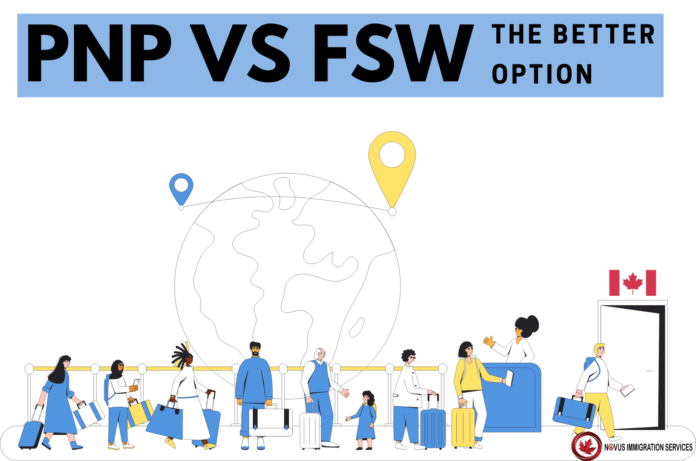Earlier last month, Immigration, Refugees and Citizenship Canada (IRCC) announced an increase in their processing fees which was applicable from 30th April 2022. In 2020, IRCC increased Permanent Residence fees to account for inflation for the first time since 2002. At that time, IRCC also announced that it would increase fees every two years to adjust for inflation.
In Canada, you always end up applying to IRCC for Permanent Residence as constitutionally, the federal government has the final say on Immigration. You can, however, also apply to individual provinces for a nomination certificate to support your PR application to IRCC. When you apply for Immigration to Canada, you usually have to pay an application fee for yourself along with any dependents accompanying you to Canada such as your spouse or common-law partner, and children.
Starting April 30th, the immigration program fees were increased by about $40 more than the current cost of $1,325. Primary applicants and dependent spouses will have to pay $1,365 in addition to biometrics fees to apply.
In the table below, you will see the different programs for which the fees were increased.
| Program | Applicants | Current fee | New fee April 30, 2022 |
|---|---|---|---|
| Right of Permanent Residence Fee | Principal applicant and accompanying spouse or common-law partner | $500 | $515 |
| Express Entry, Provincial Nominee Program and Quebec Skilled Workers, Atlantic Immigration Class and most Economic Pilots (Rural, Agri-Food) | Principal applicant | $825 | $850 |
| Accompanying spouse or common-law partner | $825 | $850 | |
| Accompanying dependent child | $225 | $230 | |
| Live-in Caregiver Program and Caregivers Pilots (Home Child Provider Pilot and Home Support Worker Pilot) | Principal applicant | $550 | $570 |
| Accompanying spouse or common-law partner | $550 | $570 | |
| Accompanying dependent child | $150 | $155 | |
| Business (Federal and Quebec) | Principal applicant | $1,575 | $1,625 |
| Accompanying spouse or common-law partner | $825 | $850 | |
| Accompanying dependent child | $225 | $230 | |
| Family Reunification (Spouses, Partners and Children; Parents and Grandparents; and other relatives) | Sponsorship fee | $75 | $75 |
| Sponsored principal applicant | $475 | $490 | |
| Sponsored dependent child | $75 | $75 | |
| Accompanying spouse or common-law partner | $550 | $570 | |
| Accompanying dependent child | $150 | $155 | |
| Protected Persons | Principal applicant | $550 | $570 |
| Accompanying spouse or common-law partner | $550 | $570 | |
| Accompanying dependent child | $150 | $155 | |
| Humanitarian and Compassionate / Public Policy | Principal applicant | $550 | $570 |
| Accompanying spouse or common-law partner | $550 | $570 | |
| Accompanying dependent child | $150 | $155 | |
| Permit Holders | Principal applicant | $325 | $335 |
In addition to the fees required to apply for immigration to the federal government, PNP and Quebec candidates often have to pay application fees to their desired province. There are now four Provincial Nominee Programs that do not charge fees to apply for nominations: Newfoundland and Labrador, Nova Scotia, Northwest Territories, and the Yukon. Newfoundland and Labrador recently removed its fees as an effort to encourage newcomers to apply for immigration to the provinces.
| Provincial Nominee Program (PNP) + Quebec | Application fee for the principal applicant |
|---|---|
| Alberta Advantage Immigration Program (AAIP) | $500 |
| British Columbia Provincial Nominee Program (BC PNP) | $1,150 |
| Manitoba Provincial Nominee Program (MPNP) | $500 |
| New Brunswick Provincial Nominee Program (NB PNP) | $250 |
| Newfoundland and Labrador Nominee Program (NLPNP) | $0 |
| Nova Scotia Nominee Program (NSNP) | $0 |
| Northwest Territories Nominee Program (NTNP) | $0 |
| Ontario Immigrant Nominee Program (OINP) | $1,500 |
| Prince Edward Island Provincial Nominee Program (PEI PNP) | $300 |
| Quebec | $844 |
| Saskatchewan Immigrant Nominee Program (SINP) | $350 |
| Yukon Nominee Program (YNP) | $0 |
Express Entry candidates who receive a provincial nomination are awarded an additional 600 points reward to their Comprehensive Ranking System (CRS) score. This award effectively guarantees an Invitation to Apply (ITA) and the ability to apply for permanent residence.
Now the question of whether you should apply directly to a federal program or a provincial one is ultimately your decision. One should base this decision on which streams they are available for and the ones that give you the best chance of getting a Permanent Residency.

